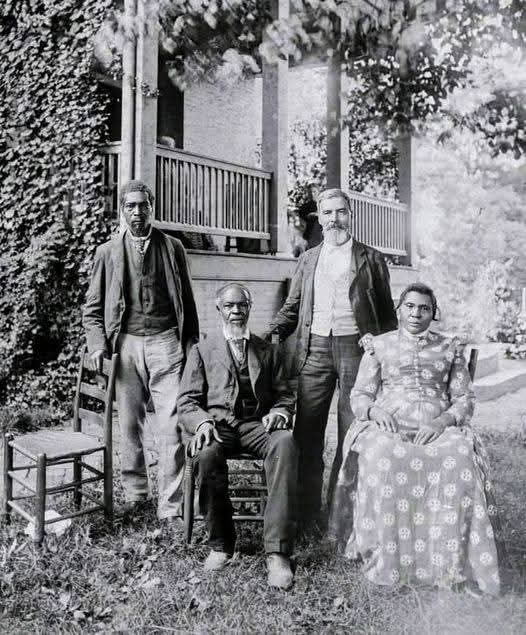Four former enslaved individuals of the Washington family of Wesyngton Plantation located in Cedar Hill in Robertson County, Tennessee, 1891.Featured: Allen Washington (standing) who worked as head dairyman; Granville Washington (standing) who worked as personal valet and body servant to George A. Washington; Emmanuel Washington (seated) who worked as the cook; and Henny Washington, who worked as the head laundress.The Washington Family of Wesyngton Plantation Plantation, established in 1802, was a prominent tobacco plantation in Cedar Hill, Robertson County, Tennessee. The Washington family, descendants of enslaved Africans, acquired the plantation after emancipation.Key Figures 1. George Washington (1829-1909): Former slave, acquired Wesyngton Plantation in 1866.2. Washington”s wife, Estred (1831-1907): Played crucial role in managing plantation.3. Their son, George Washington Jr. (1861-1931): Expanded plantation operations.Plantation Operations1. Tobacco farming: Primary crop.2. Livestock: Raised cattle, pigs, and chickens.3. Farmhands: Employed African American sharecroppers.Achievements1. Prosperous African American-owned business.2. Largest tobacco producer in Robertson County.3. Supported local African American community.Legacy1. Preserved African American agricultural heritage.2. Symbol of post-Civil War African American success.3. Listed on National Register of Historic Places (1972).Wesyngton Plantation Today 1. Operated by Washington descendants.2. Agricultural tourism destination.3. Hosts cultural events and workshops.Resources1. “Wesyngton Plantation: A Tennessee Legacy” by John F. Baker Jr.2. “The Washingtons of Wesyngton Plantation” by Cheryl Julian3. Tennessee State Historical Society
